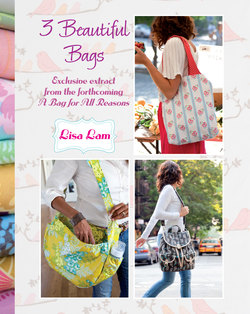Читать книгу 3 Beautiful Bags - Lisa Lam - Страница 8
ОглавлениеUsing Patterns
The patterns at the back of the book are all full-size, which means
there is no need for a photocopier. Some of the projects have two or
more pattern pieces (which are indicated on the patterns), others
have just one pattern piece and some projects simply use rectangles
given as measurements within the project instructions.
1
2
3
4
5
6
Get a large sheet of suitable paper. I usually use
pale tissue paper, but you can also use tracing
paper, greaseproof (wax) paper or dressmaking
paper. Iron the paper and the pattern sheet on a
low setting.
Lay the paper over your chosen pattern piece
and, using pins or sticky tape, secure the paper
to the pattern so that it can’t move around.
Take a soft leaded pencil (you don’t want to rip
holes in your paper with a hard pencil) and trace
around your pattern shape. Also trace the various
pattern markings, notches and darts if appropriate.
See Fig a.
Lay out your traced pattern pieces onto your
fabric. Align your pattern with the fabric’s
straight grain. If the pattern piece instructs you
to place it on a fold, fold your fabric as shown
in Fig b. Pay attention to the direction of your
pattern – are the pattern pieces the right way up?
Accordingly, is the pattern on your fabric also the
right way up?
Pin your pattern pieces to your fabric and
cut the fabric around the pattern shapes. See
Fig c. Alternatively, you can pin your patterns to your fabric and then trace around the outline of your pattern pieces with disappearing marker or chalk to get an outline for fabric cutting.
Transfer any pattern markings and notches from
the pattern piece to your fabric pieces using
chalk or disappearing marker. See Fig d.
a
Fig a Use a soft leaded pencil to trace the patterns and
pattern markings to get nice easy-to-see outlines, and you’ll
avoid ripping the tracing paper.
b
Fig b To place a pattern piece on a fold, fold the fabric wrong
sides together and position the fold line of the pattern onto
the folded edge of the fabric.
Getting Started
